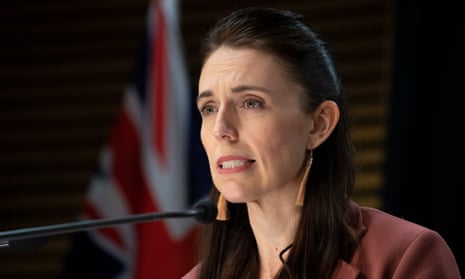Prime minister Jacinda Ardern’s popularity has plummeted in two new polls, as New Zealand struggles to contain a Delta outbreak and transitions to a new era of endemic Covid.
The Ardern-led Labour party dropped five points to 41% over the past months, according to the Talbot Mills Research poll published by the New Zealand Herald on Thursday. While that result still places it firmly ahead of the opposition National party, it represent’s Labour’s worst polling result in more than a year, and since before Covid-19 reached New Zealand. The result was echoed by Curia polling commissioned by lobby group the Taxpayer’s Union, which showed Labour support had dropped six points to 39%, with National up four points to 26%.
While Ardern was far ahead of any of her opponents in the preferred prime minister stakes, her ranking had dropped to 47% – down from previous highs of up to 65% in the midst of the early pandemic lockdowns. Curia’s polling put Ardern’s personal popularity even lower, at 34% – down 13 percentage points from last month in the preferred prime minister stakes. Opposition leader Judith Collins was wallowing at 6%, and libertarian-right-wing Act party leader David Seymour, who has enjoyed a recent surge in support, was at 10.5%.
The drop in support for the prime minister comes amid recent changes in New Zealand’s pandemic fortunes: after more than a year of keeping Covid out of the country and crushing small outbreaks as they arose, New Zealand is now battling a Delta outbreak and being forced to reckon with an imminent future of Covid circulating through the population.
New Zealanders have overwhelmingly supported their government’s Covid response so far, with public approval often reaching past the 80% mark. But the Talbot Mills poll showed that support was crumbling: those who rated the government’s handling of the pandemic as “good” had dropped from 60% in October to just 46%, and those rating it as poor rose from 16% to 26%.
“The prime minister’s own high poll ratings and Labour’s polling last year were based on a real sense of trust, earned by the Covid response,” said political analyst and former National government staffer Ben Thomas. “The greater difficulty in stamping out Delta means that trust has really been damaged – and that shows up in the polls.”
Labour is still in an extremely strong position as overall share of vote – especially when grouped with traditional coalition partners the Greens. If an election was held tomorrow, the two parties would win a majority of seats without needing other coalition partners. But there were other signs of trouble for the government in the research. In the Curia poll, the portion of New Zealanders who felt the country was headed in the wrong direction had surpassed those who thought it was headed the right way for the first time since the Global Financial Crisis. A total 44% of respondents said New Zealand was headed in the “right direction” while 45% said “wrong direction”.
“That’s the stat that wins you or loses you elections,” Thomas said. “If people think things go well, they will probably vote for the government of the day. If they don’t? They will vote for change.”
Dr Lara Greaves, co-director of the Public Policy Institute at University of Auckland, said that a downward trend line for Ardern and Labour was to be expected – and the party could not have sustained the extreme highs it reached earlier in the pandemic. “That was a huge high point … pretty much everyone has expected that Labour would never be able to hold on to that high a lead.” Under New Zealand’s coalition based mixed-member proportional representation political system, she said, “we might never see that again”.
The recent drop, Greaves said “has been exacerbated by potential discontent in Auckland,” which has now been in lockdown for three months. And while New Zealanders may currently be punishing their government for Covid difficulties, the next election was still nearly two years away, she noted.
